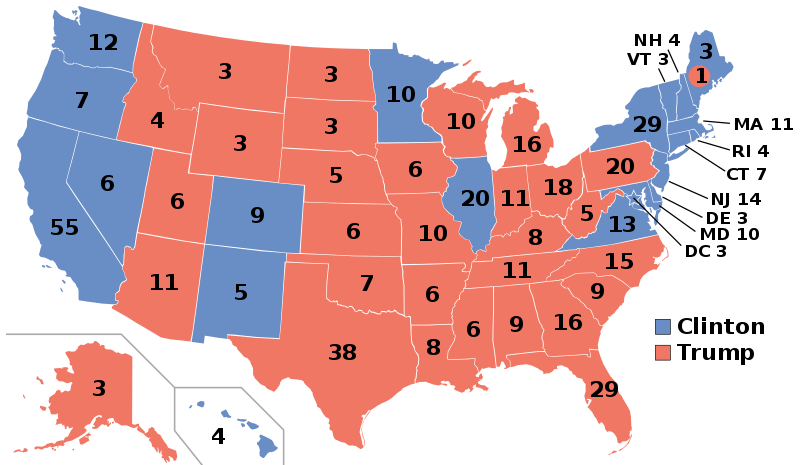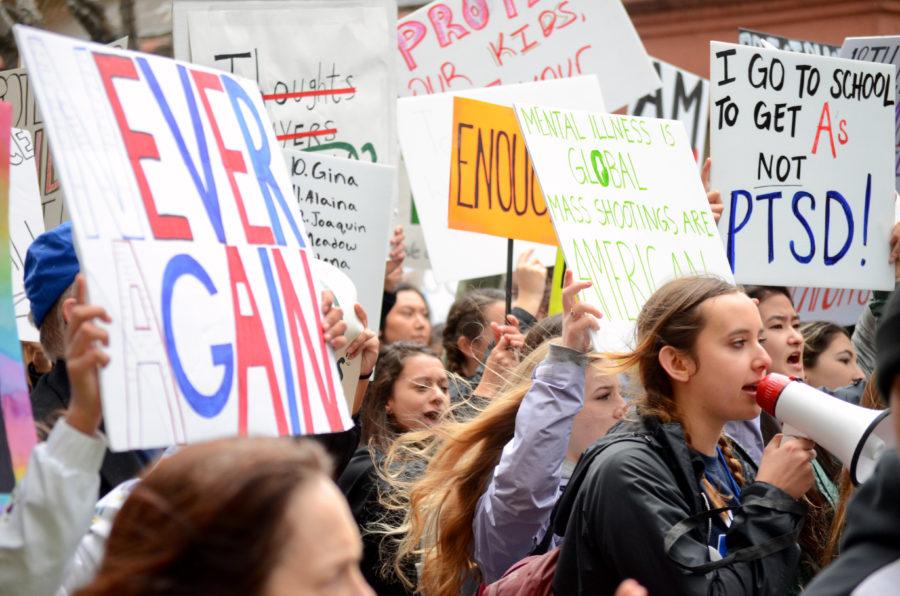CON
Sam Bernstein staff writer
America needs to repeal the Electoral College. Last Tuesday, Americans had an election, and citizens voted Hillary Clinton to be its next president. However, Clinton likely will not be our next president. In an outdated, unfair process, Donald Trump captured the presidency by beating Clinton 290-232 in the Electoral College. The American people have lost another election to political interests. America needs a direct democracy.
The Electoral College is an indirect system for electing the president of the United States using Electoral College votes. Its goal is to divide the power of selection between Congress and the people, and allow a balance between federal and state powers in keeping with federalism.
The Electoral College was created in 1787, when African-Americans counted as 3/5ths of a person. Their votes counted as 3/5ths of a Caucasian vote. The Electoral College was arguably implemented to balance out the Black vote so it wouldn’t count. The Electoral College concept and the 3/5ths Compromise were agreed upon in the same year, so to assume that this is not a coincidence seems fair. While the Electoral College may have been an effective system for slave owners in the 18th century, it is not effective now.

To compare, direct democracy is a system in which elected officials are elected solely based on the results of the popular vote. This is how Americans select their congressmen, senators and propositions. However, this is not how we vote for our president.
The major fault of the Electoral College is that the Electoral College creates a standard for candidates to completely ignore some states because they’re a shoe-in for the Electoral College votes in that state. This creates political strategy that ruins the integrity of the American political spectrum. The fact that politicians take routes to the presidency is evil. Politicians tend to campaign more, adjust their policies, and generally pay more attention to battleground states that they need votes in. This should not be the case. Politicians should represent all people in all states, not just states that are more favorable for them. If every vote counted, politicians would be fighting harder in every single state, not just the battleground ones. American politicians should be creating policies to benefit all, and not just those in targeted states.
We should expect our politicians to fight for every single person because they care about the well-being of this nation enough to run to be president of this nation. The Electoral College creates a dangerous reality that some states do not deserve the political attention that battleground states do just because they’re a shoe in for one party. Every state deserves equal consideration, and they would if every American’s vote counted.
The idea of repealing the Electoral College is attractive; however, there’s logic behind keeping the Electoral College. The reason that Americans do not directly choose their president is due to the popular opinion that smaller states would not be represented.
As said in an article on Slate published on Nov. 12, 2012, the Electoral College restores some of the weight in the political balance that large states (by population) lose by virtue of the mal-apportionment of the Senate decreed in the Constitution. However, this argument is heightened out of proportions. Small states are not well represented in the Electoral College. States such as Wyoming and South Dakota have only three votes apiece, even though their amount of voters were 171,153, and 378,995 respectively. In a close election in which 134,537,600 votes were counted, those 450,000+ would end up holding much more worth than six votes out of 528, especially when Trump unfairly dominated that 528.
Trump won more states than Clinton did. While this feat is impressive, he didn’t woo city voters. He lost the popular vote by approximately 2,000,000, and he was badly beaten in major cities such as Boston, Chicago, Indianapolis, Los Angeles, Miami and New York City. This had no effect on our choice for president. In America’s outdated system, major population hubs such as those listed are ignored. A majority of Americans live in major cities and they are not represented.
With the Electoral College in place, city voters lose their voices. Donald Trump was crushed in southern Florida, which includes a large Latino population, as Clinton got 62 percent of the Latino vote throughout the state. However, Hillary Clinton was hammered in the historically Caucasian, conservative northern part of the state, as Clinton only received 32 percent of the Caucasian vote. Because there are more conservative Caucasians then there are liberal Latinos, the liberal Latinos votes are completely cancelled out (75 percent of Florida is white, 22 percent is Hispanic.). Their voice is lost. These votes were cancelled out by the 200,000 votes for the Libertarian candidate Gary Johnson. With Trump winning Florida by less than 150,000 votes, those 200,000 votes for Gary Johnson cancelled out Clinton’s four million votes. If Clinton’s votes were added to a pool of votes from around the country, these votes would hold much more worth.
In a direct democracy, every vote matters. Every single vote ends up holding worth. All votes are added to a pool of other votes from around the country, and those four million plus voters end up completely changing the game instead of being an obscure fun fact 25 years later.
In Utah, Mormon conservative independent candidate Evan McMullin received 207,000 votes in the predominantly Mormon state. Clinton received 274,000, which were also completely cancelled out. One of the major flaws with the Electoral College is that if a third party candidate receives a mere 3-5 percent, those votes could completely counteract millions of major party candidate votes in a major election. While third party candidates deserve recognition for their hard work in some states, those votes absolutely should not ruin the efforts of another candidate.
There’s never been a democracy that only represented the majority. The Electoral College fails to echo the will of the American people. In two of our previous five elections, the American people lost. The majority of Americans picked a candidate who did not win. In a “free” nation, democracy shouldn’t take a back seat to political interests.
PRO
Jason Harward staff writer
A petition on change.org calling for the abolishment of the Electoral College has over 4 million signatures. This is, of course, in response to president-elect Donald Trump’s victory, in which Hillary Clinton won the popular vote. Yet, this view doesn’t take into account how badly a popular vote would affect people who don’t live in urban centers.
A large part of our country is falling behind economically. Sometimes referred to as the “heartland” or the “flyover states,” these people are vulnerable to sour market shifts, and their labor has become increasingly irrelevant as the world moves to globalization. Although voters may not agree with their way of life or political views, they are undeniably just as American as anyone. And, in an American political system, their voice should matter just as much as anyone’s, and politicians should pay attention to their needs.
This is one of the problems of changing to a popular vote. Yes, at a glance “one person one vote” seems fair. But, when you look at the demographics of our nation, it just isn’t. Allowing politicians to seek a majority, and not caring about where that majority comes from, is just wrong.
According to the 2010 Census, the 10 most populous states made up 54 percent of the US population. That’s right, if a politician ignored the other 40 states, and campaigned in these 10 (especially California, Texas and New York), they would win a popular vote-based election, especially when you consider that each party has a base that supports them no matter what.
This would create a new mass politics. Instead of a countrywide chess match, with each party sending resources and ground games to toss-up states, the parties would go all out in big cities and states, leaving the heartland to fend for itself.
This is what is great about the Electoral College. The Republicans stay true to their base, the Democrats stay true to theirs, and they battle for the states in between. These states tend to be more moderate in nature (think Colorado, Florida, Ohio, Pennsylvania) and thus force the two parties to lean more toward the middle–unless, of course, they don’t want to have their candidate in office.
Without an electoral college, the campaign would be a rush for votes. Say anything, do anything, just make California, New York, Florida and Texas agree with you. And, when the voting is done, we may move forward, but not without leaving people behind.
Of course, the Electoral College is not perfect. It has not reflected recent population shifts, which have ballooned the population of the western and southern portions of the country, while the midwest and northeast have not grown as much.
Though these minor tweaks can be done relatively easily, a full abolishment of the Electoral College is highly unlikely, as a full two-thirds of each house or two-thirds of the states must ratify the change, and it isn’t in the interests of smaller states to allow it to pass.
So, before complaining that Clinton is the true president of the United States, take a second to think about the downsides of a popular vote. Though the Electoral College has a few flaws, it keeps the voice of all Americans equal.
Categories:
Arguments against, for Electoral College
November 21, 2016
0
Donate to Highlights
$125
$1000
Contributed
Our Goal
Your donation will support the student journalists of Beverly Hills High School. Your contribution will allow us to purchase equipment and cover our annual website hosting costs.
More to Discover


































